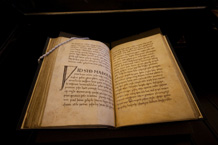
Back Exeter Book Czech Llyfr Caerwysg CY Exeter Book German Βιβλίο του Έξετερ Greek Libro de Exeter Spanish Livre d'Exeter French Ekseterboek FY Kitab Exeter ID The Exeter Book Italian エクセター本 Japanese

The Exeter Book, also known as the Codex Exoniensis or Exeter Cathedral Library MS 3501, is a large codex of Old English poetry, believed to have been produced in the late tenth century AD.[1] It is one of the four major manuscripts of Old English poetry, along with the Vercelli Book in the chapter library of Vercelli Cathedral, Italy, the Nowell Codex in the British Library, and the Junius manuscript in the Bodleian Library in Oxford. The Exeter Book was given to what is now the Exeter Cathedral library by Leofric,[2] the first bishop of Exeter, in 1072. It is believed to have originally contained 130[3] or 131 leaves, of which the first 7[3] or 8 have been replaced with other leaves; the original first 8 leaves are lost.[citation needed] The Exeter Book is the largest and perhaps oldest[3][4] known manuscript of Old English literature,[2][5][6][7] containing about a sixth of the Old English poetry that has survived.[2][8]
In 2016 UNESCO recognized the book as "the foundation volume of English literature, one of the world's principal cultural artefacts".[9][10][11]
- ^ Fell, Christine (2007). "Perceptions of Transience". In Malcolm Godden and Michael Lapidge (ed.). The Cambridge Companion to Old English Literature. Cambridge: Cambridge UP. pp. 172–89. ISBN 978-0-521-37794-2.
- ^ a b c Johnson, Keith (2016). "7.1 Manuscript collections". The History of Early English. Taylor & Francis. ISBN 9781317636069.
- ^ a b c Cite error: The named reference
UoPP2017was invoked but never defined (see the help page). - ^ "The Exeter Book". Exeter Cathedral.
- ^ Cite error: The named reference
Conner2015was invoked but never defined (see the help page). - ^ Cite error: The named reference
EBwas invoked but never defined (see the help page). - ^ Chisholm, Hugh, ed. (1911). "Exeter Book". Encyclopædia Britannica. 10. (11th ed.). Cambridge University Press. p. 67.
- ^ Gameson, Richard (December 1996). "The origin of the Exeter Book of Old English poetry". Anglo-Saxon England. 25. Cambridge University Press: 135–185. doi:10.1017/S0263675100001988. ISSN 1474-0532. S2CID 162992373.
- ^ Flood, Alison (22 June 2016). "Unesco lists Exeter Book among 'world's principal cultural artefacts'". The Guardian. Retrieved 26 June 2016.
- ^ "'Outstanding' Old English poetry book granted Unesco status". BBC News. 21 June 2016.
- ^ "Exeter Book". The British Library. Archived from the original on 19 June 2023. Retrieved 7 August 2021.